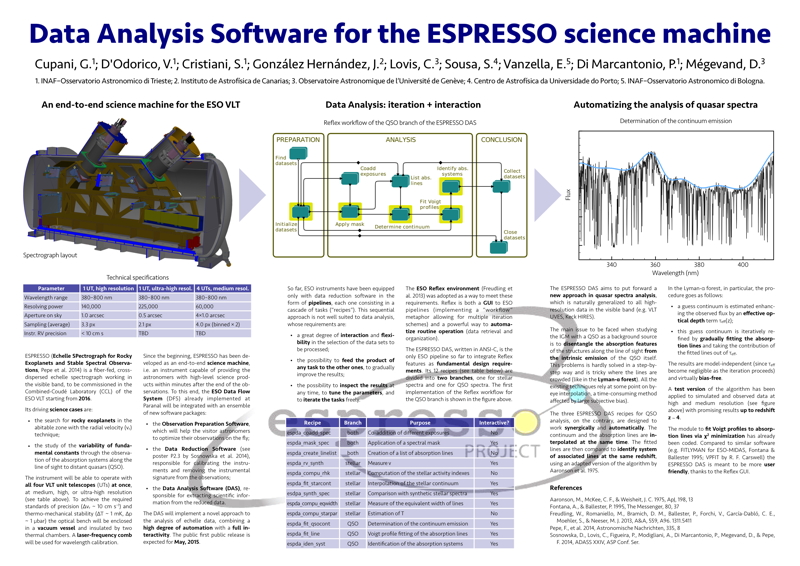Abstract: The Echelle SPectrograph for Rocky Exoplanets and Stable Spectral Observations (ESPRESSO) is an extremely stable high-resolution spectrograph which is currently being developed for the ESO VLT Combined Coudé Laboratory by an international consortium of four nations and ESO. With its groundbreaking characteristics (resolution up to ~200,000; wavelength range from 380 to 780 nm; centimeter-per-second accuracy in wavelength calibration; possibility to use all 4 unit telescope at once) ESPRESSO is aimed to be a “science machine” – i.e., an instrument whose subsystems are fully-integrated way to directly extract science information from the observations. In particular, ESPRESSO will be the first ESO instrument to be equipped with a dedicated tool for the analysis of data, the Data Analysis Software (DAS), consisting in a number of recipes to analyse both stellar and quasar spectra. In this talk, I will present my work on the quasar branch of the DAS. I will describe the details of the pipeline and of its GUI, ESO Reflex, which is aimed to get over the shortcomings of the existing software providing multiple iteration modes and full interactivity with the data. I will also discuss some new algorithms implemented in the code, which will allow to determine the continuum level of emission in quasar spectra, to fit the spectral lines, and to identify the absorption systems in a coherent scheme. The scientific importance of a carefully-designed, physically-motivated approach to data analysis will be highlighted throughout.
Authors: Guido Cupani (INAF-Osservatorio Astronomico di Trieste)
Valentina D’Odorico (INAF-Osservatorio Astronomico di Trieste)
Stefano Cristiani (INAF-Osservatorio Astronomico di Trieste)
Jonay Gonzalez-Hernandez (Instituto de Astrofísica de Canarias)
Christophe Lovis (Université de Genève)
Sérgio Sousa (Universidade do Porto)
Eros Vanzella (INAF-Osservatorio Astronomico di Bologna)
Paolo Di Marcantonio (INAF-Osservatorio Astronomico di Trieste)
Denis Mégevand (Université de Genève)
